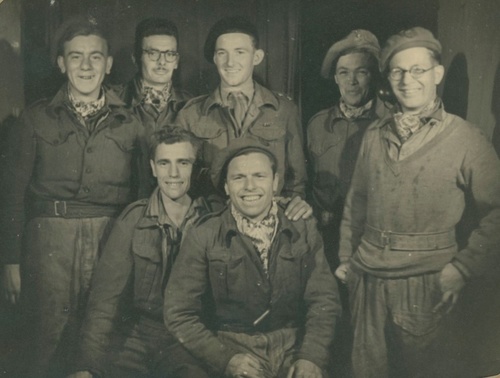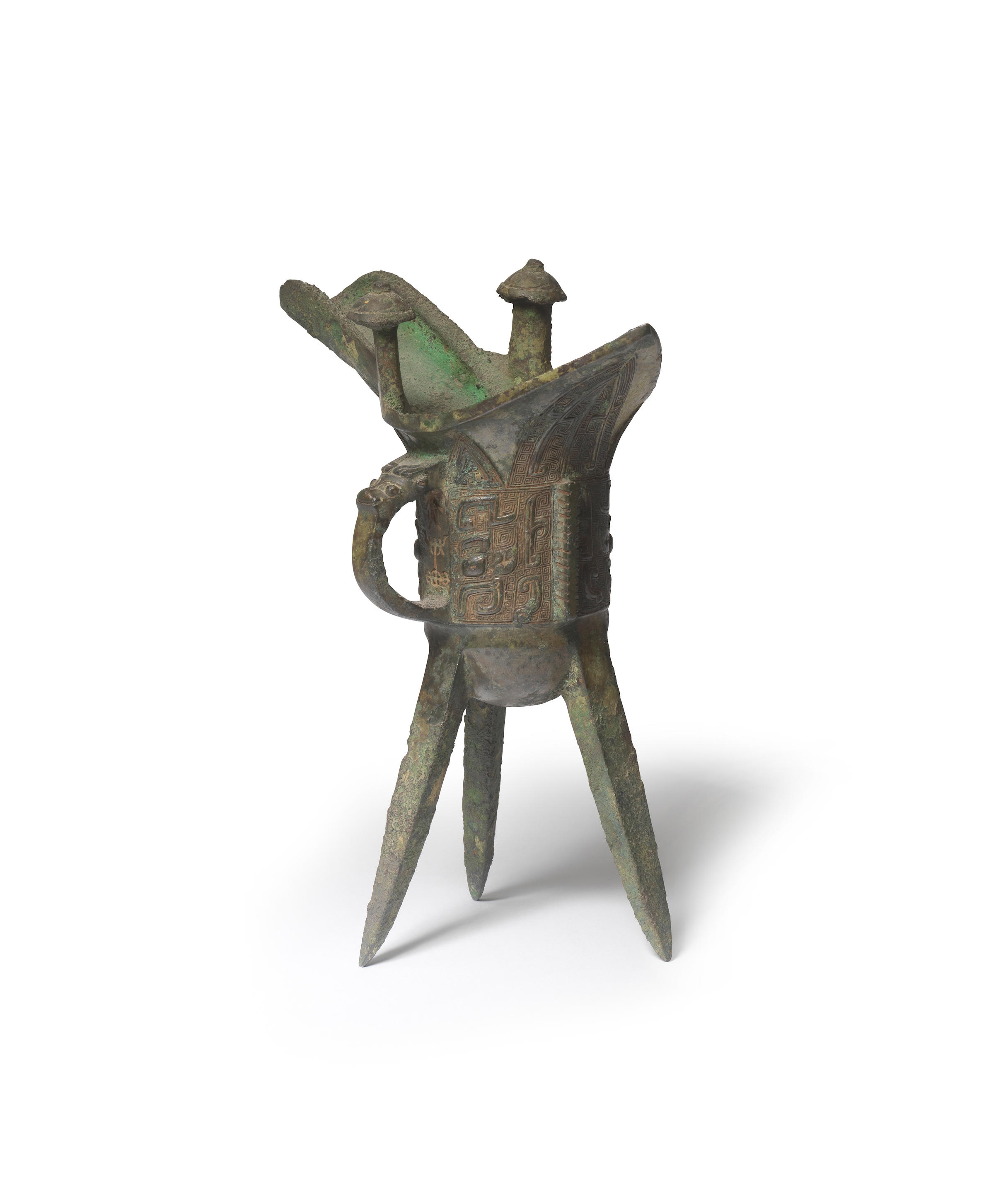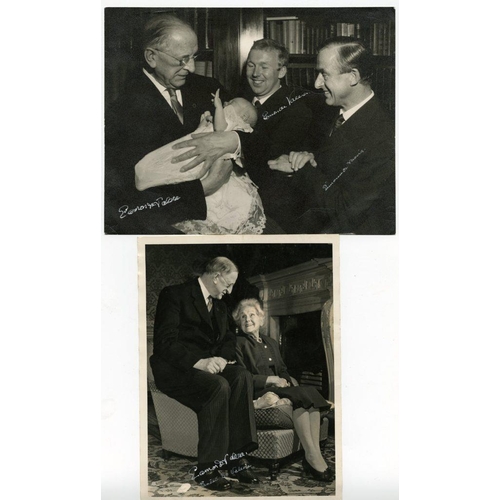Family group: A rare Second World War P.Q. 17 operation D.S.M. group of five awarded to Acting Leading Seaman D. Latch, Royal Navy Distinguished Service Medal, G.VI.R. (JX. 194886 D. Latch, A./L. Smn.); 1939-45 Star; Atlantic Star; Italy Star; War Medal 1939-45, mounted as worn, extremely fine The Great War campaign medals awarded to Acting Staff Sergeant H. J. Latch, Canadian Army Medical Corps, his father 1914-15 Star (1326 L. Cpl. H. J. Latch, Can. A.M.C.); British War and Victory Medals (1326 A.S. Sjt. H. J. Latch, C.A.M.C.), good very fine (8) £2000-2500 Footnote D.S.M. London Gazette 27 October 1942: ‘For fortitude, seamanship and endurance in taking merchantmen to North Russia through heavy seas and in the face of relentless attacks by enemy aircraft.’ Douglas Latch, a D.E.M.S. Gunner, served aboard the S.S. Navarino in the disastrous P.O. 17 operation, which ship was torpedoed and sunk in an enemy aircraft attack on 4 July. The fate of P.Q. 17 has been graphically described by such historians as David Irving (The Destruction of Convoy P.Q. 17), and by Richard Woodman (Arctic Convoys), but in terms of more immediate statistics it is worth recording that the convoy originally assembled at Reykjavik on 27 June 1942, a formidable gathering that in addition to the naval escort comprised 22 American, eight British, two Russian, two Panamanian and one Dutch merchantmen. In their holds they carried sufficient supplies to re-arm a good portion of the Stalin’s forces - 297 aircraft, 594 tanks, 4246 military vehicles and over 150,000 tons of other vital military stores and cargo: but most of this equipment never reached Russia, for just a few days later, following Sir Dudley Pound’s fateful order for the convoy to scatter, no less than 23 of these merchantmen were lost to enemy action. Among the latter, as stated, was the Navarino, under the command of Captain Archibald Kelso. Richard Woodman’s Arctic Convoys takes up the story, as enemy aircraft closed the convoy for a second assault on the evening of 4 July 1942: ‘The leading Heinkel, piloted by Leutnant Hennemann, thundered towards a column interval over P. 614 upon which it released a bomb and then banked across the bow of the Pozarica with all the panache of a medieval Landsknecht, apparently contemptuous of the shell bursts of the ack-ack ship’s pom-poms. Behind Hennemann, his comrades levelled at the William Hooper which was hit by a torpedo that blew the boiler out of the ship. Hennemann’s plane had been hit by gunfire several times and was now on fire. From the Aldersdale men could see into the Heinkel’s cockpit, for the aircraft was low, so low in fact that he tracking gunners ignored all warnings and fired into adjacent ships. Empire Tide and Ironclad were both victims of this incaution. As flames licked about him, Hennemann released his torpedoes. They bounced on the water, disappeared and a few seconds later struck the British freighter Navarino which was engulfed in smoke as the weapons detonated. Lowered in haste, her lifeboats slipped their falls and dangled uselessly as her men went over the side into the icy water. Astern of Navarino, Bellingham hauled out of her line to avoid the settling ship, her gunners leaning over the side as she steamed through the British seamen in the water. One gave the Communist salute and bawled defiantly, ‘On to Moscow – see you in Russia!’ Meanwhile the blazing Heinkel hit the water ahead of Keppel and, as the El Capitan passed, her burning crew could be seen dying in her sinking airframe. The men on deck shouted abuse as the shattered Heinkel sank. One by one the ships in the outer port columns overtook the spot, and by the time the Troubadour had gone by, all that remained was a dark swirl of oily water and a curling, ghostly flame. Leutnant Hennemann was posthumously awarded the Knight’s Cross, and scarcely a witness in P.Q. 17 was unimpressed with his daring.’ And a glimpse of Latch at work is too be found in Captain Kelso’s su
Family group: A rare Second World War P.Q. 17 operation D.S.M. group of five awarded to Acting Leading Seaman D. Latch, Royal Navy Distinguished Service Medal, G.VI.R. (JX. 194886 D. Latch, A./L. Smn.); 1939-45 Star; Atlantic Star; Italy Star; War Medal 1939-45, mounted as worn, extremely fine The Great War campaign medals awarded to Acting Staff Sergeant H. J. Latch, Canadian Army Medical Corps, his father 1914-15 Star (1326 L. Cpl. H. J. Latch, Can. A.M.C.); British War and Victory Medals (1326 A.S. Sjt. H. J. Latch, C.A.M.C.), good very fine (8) £2000-2500 Footnote D.S.M. London Gazette 27 October 1942: ‘For fortitude, seamanship and endurance in taking merchantmen to North Russia through heavy seas and in the face of relentless attacks by enemy aircraft.’ Douglas Latch, a D.E.M.S. Gunner, served aboard the S.S. Navarino in the disastrous P.O. 17 operation, which ship was torpedoed and sunk in an enemy aircraft attack on 4 July. The fate of P.Q. 17 has been graphically described by such historians as David Irving (The Destruction of Convoy P.Q. 17), and by Richard Woodman (Arctic Convoys), but in terms of more immediate statistics it is worth recording that the convoy originally assembled at Reykjavik on 27 June 1942, a formidable gathering that in addition to the naval escort comprised 22 American, eight British, two Russian, two Panamanian and one Dutch merchantmen. In their holds they carried sufficient supplies to re-arm a good portion of the Stalin’s forces - 297 aircraft, 594 tanks, 4246 military vehicles and over 150,000 tons of other vital military stores and cargo: but most of this equipment never reached Russia, for just a few days later, following Sir Dudley Pound’s fateful order for the convoy to scatter, no less than 23 of these merchantmen were lost to enemy action. Among the latter, as stated, was the Navarino, under the command of Captain Archibald Kelso. Richard Woodman’s Arctic Convoys takes up the story, as enemy aircraft closed the convoy for a second assault on the evening of 4 July 1942: ‘The leading Heinkel, piloted by Leutnant Hennemann, thundered towards a column interval over P. 614 upon which it released a bomb and then banked across the bow of the Pozarica with all the panache of a medieval Landsknecht, apparently contemptuous of the shell bursts of the ack-ack ship’s pom-poms. Behind Hennemann, his comrades levelled at the William Hooper which was hit by a torpedo that blew the boiler out of the ship. Hennemann’s plane had been hit by gunfire several times and was now on fire. From the Aldersdale men could see into the Heinkel’s cockpit, for the aircraft was low, so low in fact that he tracking gunners ignored all warnings and fired into adjacent ships. Empire Tide and Ironclad were both victims of this incaution. As flames licked about him, Hennemann released his torpedoes. They bounced on the water, disappeared and a few seconds later struck the British freighter Navarino which was engulfed in smoke as the weapons detonated. Lowered in haste, her lifeboats slipped their falls and dangled uselessly as her men went over the side into the icy water. Astern of Navarino, Bellingham hauled out of her line to avoid the settling ship, her gunners leaning over the side as she steamed through the British seamen in the water. One gave the Communist salute and bawled defiantly, ‘On to Moscow – see you in Russia!’ Meanwhile the blazing Heinkel hit the water ahead of Keppel and, as the El Capitan passed, her burning crew could be seen dying in her sinking airframe. The men on deck shouted abuse as the shattered Heinkel sank. One by one the ships in the outer port columns overtook the spot, and by the time the Troubadour had gone by, all that remained was a dark swirl of oily water and a curling, ghostly flame. Leutnant Hennemann was posthumously awarded the Knight’s Cross, and scarcely a witness in P.Q. 17 was unimpressed with his daring.’ And a glimpse of Latch at work is too be found in Captain Kelso’s su









/88238/Internet%20Image%201.jpg)
/86450/Internet%20Image%201.jpg)
/77768/Internet%20Image%201.jpg)



Testen Sie LotSearch und seine Premium-Features 7 Tage - ohne Kosten!
Lassen Sie sich automatisch über neue Objekte in kommenden Auktionen benachrichtigen.
Suchauftrag anlegen